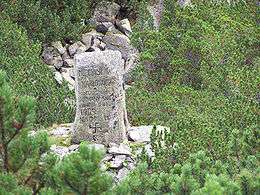Mieczysław Karłowicz

Mieczysław Karłowicz ([miɛt͡ʂɨswaf ˈkarwɔvit͡ʂ], 11 December 1876 – 8 February 1909) was a Polish composer and conductor.
Life
Karłowicz was born in Vishneva (now part of Belarus) into a noble family, being part of the Clan of Ostoja. His father Jan was a Polish linguist, lexicographer and musician. As a child he studied the violin, for which instrument he later wrote his only concerto.
Karłowicz studied at Warsaw with Zygmunt Noskowski, Stanisław Barcewicz, Piotr Maszyński and Gustaw Roguski. He later studied in Berlin with Heinrich Urban, for whom he dedicated his Serenade for Strings which he composed and performed when he was still Urban's student. From 1906 to 1907 he studied conducting with Arthur Nikisch.
Career

Karłowicz's music is of a late Romantic character. He was great admirer of Pyotr Ilyich Tchaikovsky whose Symphony No. 6 he praised. Tchaikovsky's influence can be heard in Karłowicz's earlier works, most notably the E minor symphony and the Violin Concerto. Like most of the late Romantics he also fell under the considerable influence of Richard Wagner, especially with Tristan und Isolde. Nevertheless, he managed to develop an original musical language expressed in harmony and orchestration, the latter of which he mastered like few other composers and wrote some of the most colourful orchestral music ever found.
Karłowicz's music inhabits a primary place in the history of Polish music between Frédéric Chopin and Karol Szymanowski. Among his works are a Symphony in E minor (Rebirth, Op. 7), a Violin Concerto in A major (Op. 8), and several tone poems, which include Eternal Songs, Stanisław i Anna Oświecimowie, The Returning Waves and The White Dove. The Violin Concerto was written for and dedicated to his former teacher Stanisław Barcewicz, who premiered the work under Karłowicz's baton in Berlin on 21 March 1903 with the Berlin Philharmonic.[1]
He also wrote a number of songs for voice and piano, setting words by Kazimierz Przerwa-Tetmajer, Adam Asnyk, and others. Much of the rest of his small output was lost during World War II. Karłowicz spent much of his later life in Zakopane in southern Poland, often enjoying one of his favorite hobbies, photography, in the nearby mountain scenery. Karłowicz died at the age of 32 in an avalanche while skiing on an excursion in the Tatra mountains in 1909. He was buried at Warsaw's Powązki Cemetery.
Recent bibliography
- Luca Sala, European Fin-de-siècle and Polish Modernism. The Music of Mieczysław Karłowicz, Bologne, Ut Orpheus Edizioni, 2010.
- Christophe Jezewski, Le Retour d'un génie. Pour le centenaire de Mieczysław Karłowicz, in "Europe", n°961, Paris, mai 2009.
- Janusz Mechanisz: Mieczysław Karłowicz, Polihymnia, 2009, ISBN 978-83-7270-610-2
- Henryk Anders, Mieczysław Karłowicz. Życie i dokonania, Poznań, ABOS, 1998.
- Wightman, Alistair. Karłowicz, Young Poland and the Musical Fin-de-siècle, Aldershot, Ashgate, 1996; Polish translation by Ewa Gabryś, Karłowicz. Młoda Polska i muzyczny fin de siècle, Kraków, PWM, 1996 (Monografie Popularne).
- Leszek Polony, Poetyka muzyczna Mieczysława Karłowicza, Cracow, PWM, 1986.
- Paul-Gilbert Langevin, Musiciens d'Europe, "La Revue Musicale", Editions Richard Masse, Paris, 1986.
- Elżbieta Dziębowska, éd. Z życia i twórczości Mieczysława Karłowicza, Cracow, PWM, 1970.
See also
References
External links
- "Polish culture profiles: Mieczysław Karłowicz". Retrieved 2007-01-07.
- Free scores by Mieczysław Karłowicz at the International Music Score Library Project
- "Karłowicz's Stone - the last itinerary of Mieczyslaw Karłowicz (music, photos, videos, maps)". Retrieved 2009-02-23.
- Mieczysław Karłowicz at AllMusic
- Mieczysław Karłowicz at Find a Grave